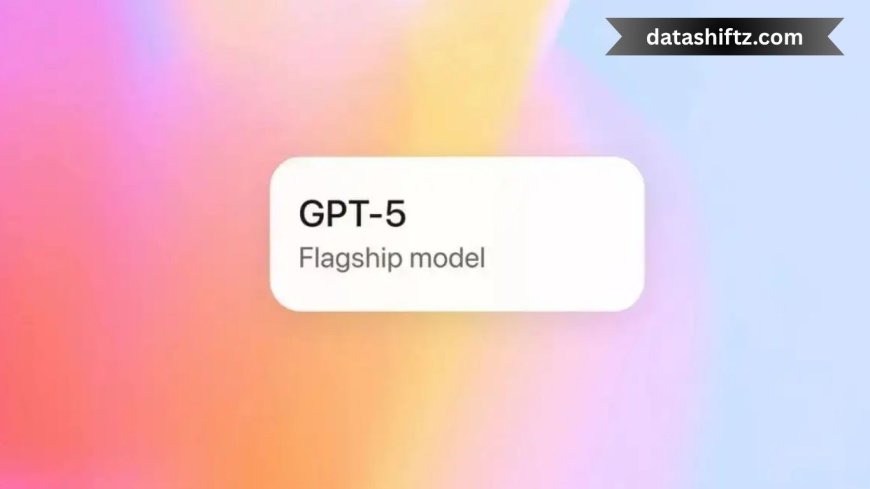ChatGPT-5: Features & Everything You Need to Know

The Evolution Continues: OpenAI Releases ChatGPT-5
In the fast-paced world of artificial intelligence, the arrival of ChatGPT-5 marks another significant leap forward. Since its initial debut, OpenAI's ChatGPT has redefined how we interact with machines. With each new version—GPT-3, GPT-3.5, GPT-4, and GPT-4o—we’ve witnessed remarkable improvements in natural language understanding, contextual awareness, and multimodal capabilities. Now, ChatGPT-5 is here, and it's already making headlines in tech communities, enterprises, and educational institutions worldwide.
OpenAI officially released ChatGPT-5 in August 2025, bringing major enhancements in performance, reliability, contextual memory, real-time reasoning, and personalization.
This blog post explores the latest news surrounding ChatGPT-5, its new features, use cases, expert opinions, and what it means for the future of AI.
What’s New in ChatGPT-5?
ChatGPT-5 introduces several groundbreaking improvements over its predecessors. Let’s break down the key updates:
Upgrades in ChatGPT-5
| Feature | ChatGPT-4o | ChatGPT-5 |
|---|---|---|
| Release Date | May 2024 | August 2025 |
| Multimodal Input (Image, Audio) | Yes | Yes (enhanced accuracy & speed) |
| Context Window | 128K tokens | 1M tokens (longer memory) |
| Real-Time Reasoning | Limited | Advanced real-time reasoning |
| Personalized AI Profiles | No | Yes – customizable personalities |
| Emotional Recognition | Basic | Advanced sentiment & emotional mapping |
| Tool Integration | Web, Python, DALL·E | Expanded API ecosystem |
| Enterprise Adaptability | Good | Excellent – private deployments & control |
Top Features of ChatGPT-5
1. Hyper-Personalized Interactions
Users can now create custom AI profiles. Whether you're a student, developer, writer, marketer, or therapist, ChatGPT-5 can adjust its language, tone, and problem-solving style accordingly.
2. Massive Contextual Memory
The 1 million-token context window means GPT-5 can remember entire books, large codebases, or multi-session interactions—making it more coherent in long-form discussions or document analysis.
3. Faster, Smarter Multimodal Capabilities
ChatGPT-5 handles images, voice commands, diagrams, graphs, and even video inputs more effectively than ever before. It offers real-time transcription, visual analysis, and can provide insights from uploaded media within seconds.
4. Improved Emotional Intelligence
ChatGPT-5 can now recognize user emotions with higher accuracy. It adjusts its tone to support empathy, making it useful for therapy, coaching, or even customer service bots.
Where Is ChatGPT-5 Being Used Today?
As of August 2025, ChatGPT-5 is already being adopted in various sectors. Here's a breakdown:
Business & Enterprise
-
Customer Support: Personalized, scalable, and available 24/7.
-
HR & Recruiting: Intelligent resume scanning and candidate communication.
-
Data Analysis: GPT-5 can now analyze complex spreadsheets and financial reports.
Education
-
Tutoring: AI tutors can offer step-by-step solutions tailored to a student's learning style.
-
Research Assistance: Generate literature reviews or summarize academic papers.
-
Language Learning: GPT-5’s tone correction and dialogue simulation are invaluable.
Software Development
-
Code Review: Identifies bugs and suggests optimizations in real-time.
-
Pair Programming: GPT-5 can serve as a coding assistant across various languages.
Expert Opinions on ChatGPT-5
What Do Industry Leaders Say?
Top voices in tech have already shared strong opinions:
“ChatGPT-5 is the first AI that feels truly collaborative. It’s no longer just a tool—it’s a teammate.”
— Satya Nadella, CEO of Microsoft
“The integration of multimodal reasoning and memory expansion in GPT-5 is staggering. It’s redefining what we thought was possible in digital communication.”
— Fei-Fei Li, Professor, Stanford University
How to Access ChatGPT-5
ChatGPT-5 is available through:
-
ChatGPT Web App (chat.openai.com): For free-tier users with limited features.
-
ChatGPT Plus and Pro Users: Full access including memory, tools, and longer context.
-
API Access: For developers via OpenAI API.
-
Enterprise Deployments: Custom integrations for companies and organizations.
Pros and Cons of ChatGPT-5
Pros
-
Exceptional reasoning and contextual understanding
-
Secure, user-controlled memory settings
-
Cross-platform integration (iOS, Android, Desktop)
-
Voice, image, and document processing built-in
Cons
-
Higher subscription cost for premium features
-
Still requires supervision for critical use cases (e.g., medical, legal)
-
Learning curve for full customization
Use Cases of ChatGPT-5 in Daily Life
Here’s a list of practical everyday uses of ChatGPT-5:
-
Writing and Editing: Blog posts, essays, emails, and reports.
-
Language Translation: Real-time multilingual communication.
-
Health & Wellness Coaching: Track routines, offer motivation.
-
Financial Planning: Budget creation and investment education.
-
Travel Planning: Itineraries, booking assistance, local tips.
-
Legal Document Review: Summarizes contracts and detects risks.
-
Parenting Assistant: Suggests educational activities and screen-time schedules.
What’s Next After GPT-5?
OpenAI has hinted at a modular, open-source extension system coming soon, where users can plug in personalized datasets, business logic, or third-party tools—effectively making GPT-5 a foundational operating system for digital thinking.
There is also speculation about GPT-5.5 or GPT-6 with even greater autonomous capabilities, offline functionality, and decentralized AI models—but for now, GPT-5 sets the standard.
Conclusion: The Future Is Already Here
ChatGPT-5 is not just an update—it’s a redefinition of AI’s role in our digital lives. Its blend of power, personalization, and intelligence makes it more than a chatbot. It’s an assistant, advisor, and creative collaborator rolled into one.
Whether you're an enterprise leader, student, developer, or casual user, ChatGPT-5 offers tools to make your work faster, your learning deeper, and your communication smarter.





























